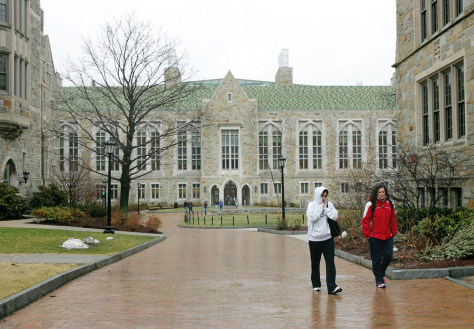College freshmen face major dilemma
Indecision about courses of study can prove expensive


Ask young children what they want to be when they grow up and the answer will change three times before dinner. Ask them when they are 18 and the answer is unlikely to be any more decisive.
Eighty percent of college-bound students have yet to choose a major, according to Dr. Fritz Grupe, founder of MyMajors.com. But they are still expected to pick schools, apply to and start degree programs without knowing where they want to end up. It is little wonder 50 percent of those who do declare a major, change majors — with many doing so two and three times during their college years, according to Grupe.
While it is difficult enough watching children struggle to find their life’s path, it can also be costly. With tuition averaging $13,833 a year at public universities, indecisiveness can drain college savings accounts as students restart course sequences or transfer schools — losing credits in the process. Ultimately they risk extending their college days beyond the four years parents planned to finance.
According to the College Board, five- and six-year students are not uncommon. Roughly 40 percent of those who start a four-year degree program still have not earned one after year six. And while the graduation rates are better at private schools where higher tuitions provide incentive not to linger, long-termers can still be found. Such extended stays are not new, and the overall numbers have been consistent over the last few years, but some universities are concerned. The longer students take to graduate, the fewer the slots there are for new students coming in.
Surcharge for slowness
“Our board took action when it noticed more of our students were taking longer to complete their education,” says Doug Bradley, director of communications for the University of Wisconsin System. They instituted an ‘excess credit’ surcharge to encourage students to move on with their lives. The surcharge, which kicks in at 30 credits above the 135 normally needed to graduate, doubles a student’s tuition. Though assessed on a case-by-case basis, it is currently being applied, confirms Bradley. And other schools are taking note.
There are a variety of good reasons for dragging a college career into its fifth and sixth years—from taking time off for foreign study, to taking advantage of internships or needing to balance academics with part-time employment to pay tuition. But changing majors is the one thing that drives up an education’s cost while potentially driving down a student’s self-esteem. It is also the easiest to avoid.
The key, according to Grupe, is helping students — preferably while still in high school — identify those areas of study best suited for them before the college tuition clock ever starts ticking.
At his Web site, he offers an online survey that does just that. It was developed after years of compiling data on what it takes to succeed in different fields of study. A student’s responses to questions regarding personal interests, temperaments, value systems and academic history are matched to those majors where they are most likely to find success and satisfaction. The site then links the list of potential majors to a broad range of associated career choices for further investigation. The choices are much broader than most parents and many high school counselors would know about or think to discuss with a student, says Grupe.
The accuracy of the program has been put to the test by a number of adults, long past their college days. “Quite a few parents take the survey to test it. They tend to be surprised by how close it gets to predicting where they actually ended up,” says Grupe. [Author's note: I took the survey. It accurately reflected not only the major choices I dealt with 20 years ago but also the odd career path I followed. It probably would have saved me some time and agony, though I did change majors and still graduated early.]
While Kate Brooks, director of liberal arts career services at the University of Texas at Austin thinks surveys can help focus a student’s attention on potential courses of study, she warns about their tendency to apply the results too inflexibly. “Often a student will say, ‘the test says I should be a florist, so that’s what I have to be,’” she says. Brooks favors another exercise to help undecideds identify and translate interests into majors and eventually careers they will succeed in and enjoy.
She sends students to the nearest Barnes & Noble or Borders to browse the magazine racks. They are instructed to buy the three magazines they find most interesting. “We then discuss what prompted them to buy those magazines. It may be they chose Newsweek because they are interested in current events and politics. Or possibly there was an article in ESPN about nutritional sports bars. We talk about how pursuing chemistry could lead them to create a better bar or sports drink. Or maybe it is the marketing aspect that appeals to them — the ads. The point is to help them understand what things excite them and what careers are connected to those things, and which majors would lead them to those careers,” explains Brooks.
However they get there, encouraging children to think things through before choosing a school or program can help them avoid future frustration, academic let-down or feelings of failure. It is also key to helping them graduate in four years and move into their ‘real’ lives before they out-spend their college savings accounts.
Tips for helping a child choose a major
What can parents do to help their children get through college in a timely fashion? Here are some suggestions compiled from conversations with academic advisors who work with undecided college students:
- Refrain from pressuring children into making quick choices or pursuing majors associated with high income professions. Not everyone should or can be a doctor or a lawyer.
- Focus attention on pursuing courses of interest, even if the immediate relationship to a major or career is not obvious.
- Help students understand that piling on majors and minors will harm rather than help them in job interviews. Potential employers will want to know why they did not just get a master's degree.
- Encourage participation in job shadowing — going to work with people to see what their jobs actually entail and asking people they meet how they got into their careers.
- If they do enter school undecided, encourage them to follow a course of study that keeps their options open until they decide. Declaring a major just to have one can rack up the years and money spent as an undergraduate.
- Refrain from giving advice based on the job market of twenty-some years ago. Today’s employers need a different kind of worker and favor different degrees. As soon as doubts about their current major surface, encourage them to reassess. The sooner they change directions, the more likely they will stay on course for a four-year graduation.
- Urge them to take full advantage of campus advisory services to avoid floundering, shifting from one course of study to the next, and prolonging their dissatisfaction and their academic careers.
- Help them understand that a major is not a career. There are multiple paths to most careers, just as there are multiple careers that can be had from a single major. Encourage them to explore their options.
- Help them prepare academically before arriving at college to avoid spending their high-priced time on remedial or review classes.
- If a child is undecided, consider seeking out a college with the resources to acquaint them with all the options to make a well-founded decision. Not all schools have or emphasize such programs.
- Understand that the student-to-counselor ratio averages 450-to-1 nationally at the high school level. Do not rely on high school counselors alone to guide children through the exercise of choosing a major.
(Compiled based on conversations with academic advisors Jo Anne Huber and Kate Brooks, The University of Texas at Austin; Michael Leonard, Penn State; Jane Jacobson, Iowa State University; and Dr. Fritz Grupe, MyMajors.com.)





 Grit: the power of passion and perseverance | Angela Lee Duck...
Grit: the power of passion and perseverance | Angela Lee Duck...



















